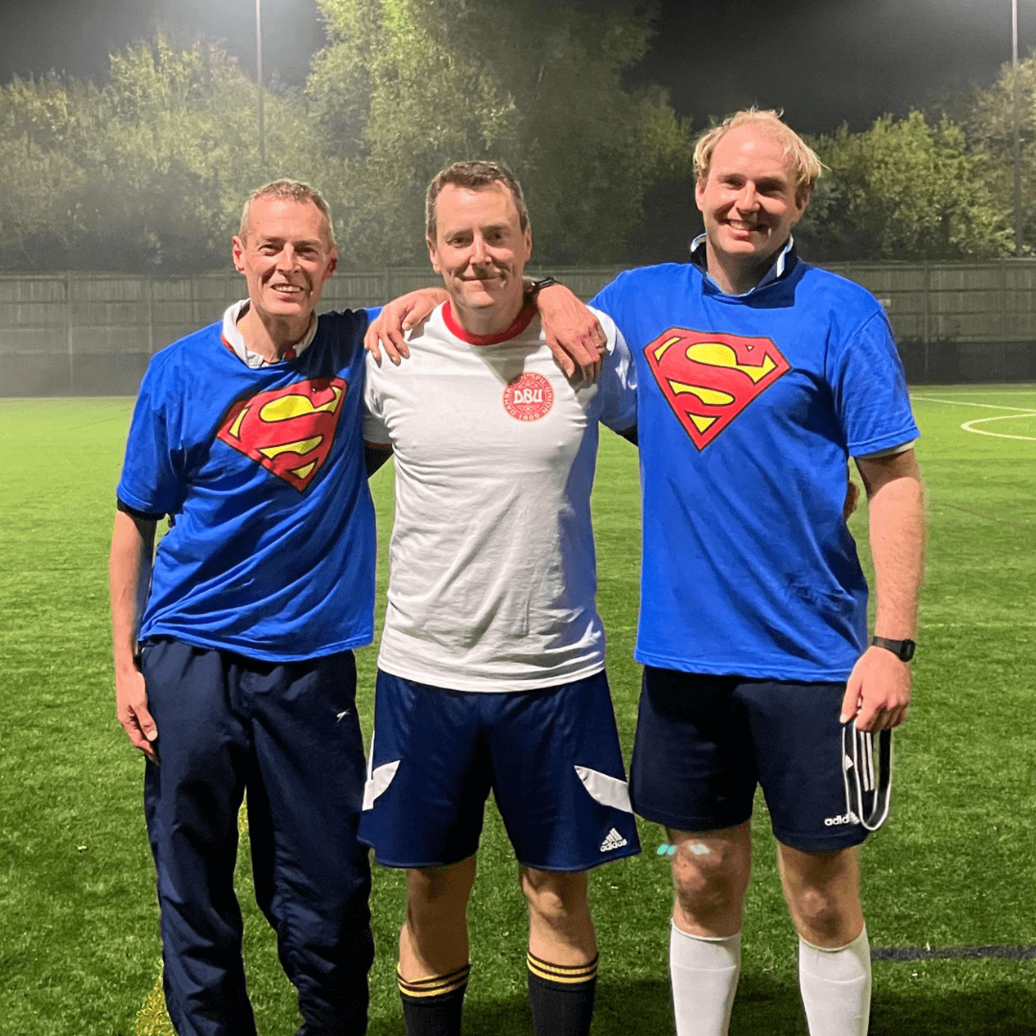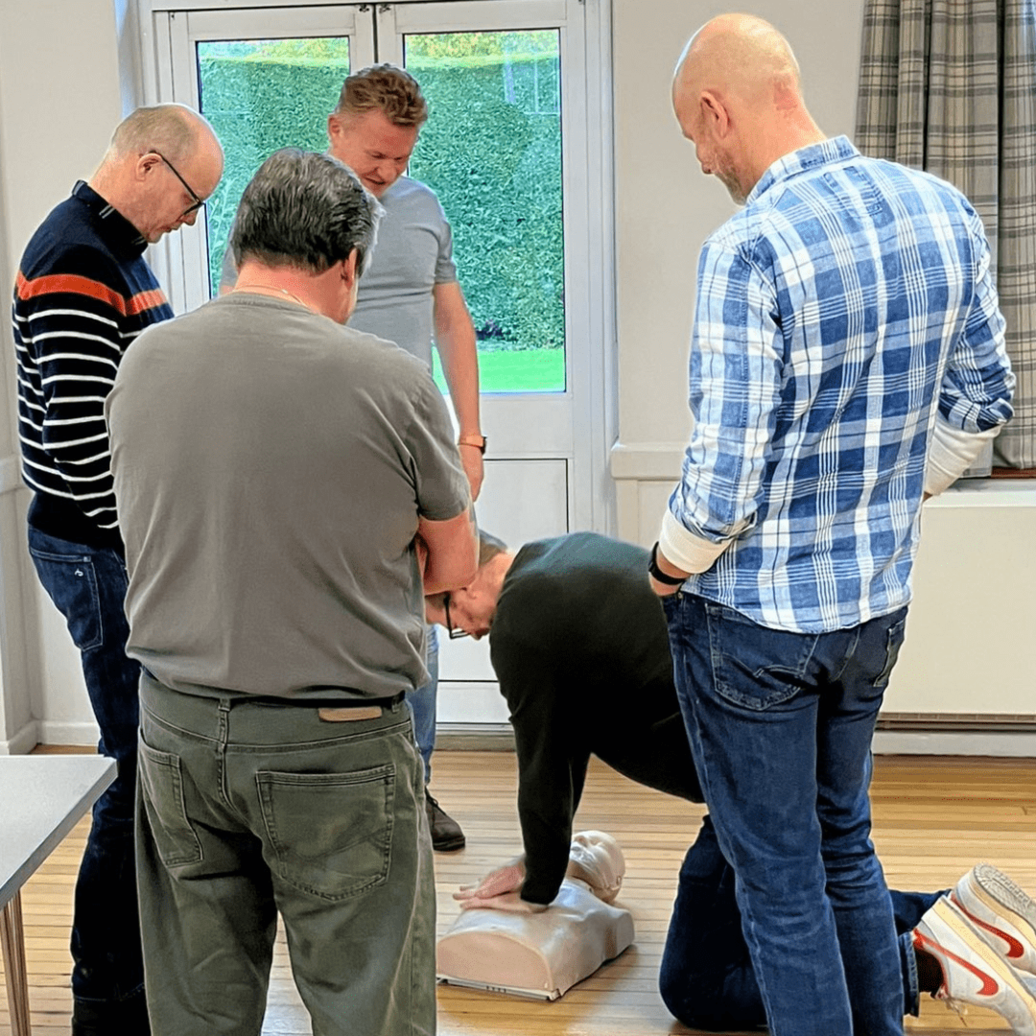Clinical Director urges others to learn life-saving CPR following cardiac arrest
- 07 November 2023
- 4 min read
An Oxfordshire football team undertook CPR training after three players saved the life of the NIHR Thames Valley and South Midlands Clinical Research Network's Clinical Director who collapsed during a weekly kickabout.
Witney’s Slow Motion Football Club received training in cardiopulmonary resuscitation (CPR) on Saturday 4 November after Dr Nick Thomas, 45, collapsed from cardiac arrest.
Nick - who is also a GP at the town’s Windrush Medical Practice - suffered a heart attack which led to cardiac arrest, where the heart’s electrical system stops working properly. The heart stops pumping blood so oxygen cannot enter the brain.
Three teammates performed CPR chest compressions, which keeps the heart pumping blood around the body, until emergency help arrived. Without CPR, the person will die within minutes.
Nick said: “People wouldn’t know how to do CPR without there first being research into how best to administer it. CPR guidelines are reviewed and updated based on new evidence that comes from research studies which inform the way CPR is taught.”
Nick, a father-of-three, was taken by ambulance from the Witney Artificial Turf Pitch in Gordon Way to the John Radcliffe Hospital in Oxford on 10 August. He awoke in hospital two days later.
He said: “It was a massive shock to wake up in intensive care and be told I’d had a cardiac arrest. I’ve got no previous history of heart issues so it was a real shock to me and my family.
“I’m enormously grateful to my teammates who performed CPR on me. I’m really lucky that there were guys there who had been trained and knew what to do.
“Knowing CPR can literally be a life-saver and I am proof of that. By knowing what to do, you can keep a person alive until the paramedics come. It’s really simple to learn and to do, there’s nothing to be afraid of.”
Ray Keating, a police officer in the Metropolitan Police Service and Henry McKechnie, a firefighter in the Oxfordshire Fire and Rescue Service performed CPR for 20 minutes until an ambulance arrived. Another teammate used a defibrillator, a device that delivers a high-energy electric shock to the heart, which was stored at the ground.
Both Ray and Henry had received CPR training as part of their jobs.

Ray Keating (left), Nick Thomas (centre) and Henry McKechnie (right) at Witney Artificial Turf Pitch.
Ray said: “When Nick collapsed Henry and I ran over to him and started CPR immediately, as it was clear that he wasn’t breathing. When you’re performing CPR, you don’t really have time to think. The adrenaline kicks in and it’s pretty intense. You just do what you need to do to keep that person alive.”
Henry said: “I’ve given CPR a fair few times but this was by far the most positive response I’ve seen as there was a really short amount of time from when Nick collapsed to when we started CPR. I felt relieved that we were able to do so much to help him, so quickly.”
Nick had an implantable cardioverter defibrillator (ICD), a small device which monitors heart rate, implanted under the skin on his chest. If the ICD notices a dangerous heart rhythm, it will either deliver electrical impulses or electric shocks to try to restore the heart to a normal rhythm and avoid another cardiac arrest.
The training was organised for club members and their partners at by fellow teammate Jeremy Habberley.
Jeremy, who works for a company which provides emergency services with radio communications equipment said: “I realised how lucky we were that people who know CPR were there that night. If Nick’s cardiac arrest had happened another week, those men may not have been there and his life may not have been saved.
“The majority of people in the football club are in their forties and fifties, it’s that age range where something like this is more likely to happen.”
The training was delivered by Dick Tracey, a paramedic who served 24 years with South Central Ambulance Service. He now provides CPR training in Oxfordshire.

Slow Motion Football Club players practising CPR.
Dick said: “If a person has a cardiac arrest and doesn’t receive CPR, their chances of survival decreases by 10% for every minute they wait for an ambulance. That means there is a 10-minute window of opportunity to start CPR and potentially save a life.
“When I do these training sessions, I find that most people want to learn how to do CPR but lack the confidence. I say to people that we wouldn’t be frightened of using a fire extinguisher if there was a fire, so we shouldn’t be frightened of giving CPR.”
Nick is currently doing well and returned to work 8 weeks after his cardiac arrest. He is following a cardiac rehabilitation programme, which consists of exercises to gradually build up fitness and strength. Nick also takes different medications to help his heart recover.
For information about administering CPR visit nhs.uk/conditions/first-aid/cpr/


